An appeal letter is written to a decision-making authority to try to persuade them to reconsider the decision they have made about you.
For example, the letter’s recipient can be an employer, a university or college admissions committee, a school administrator, a hiring committee, etc. You’re expected to state your case and give valid reasons for your appeal using logical arguments. You should also be able to demonstrate how the decision is likely to affect you and any other parties involved.
This article will provide you with a complete guide to writing an effective appeal letter, including the pre-considerations to keep in mind before writing the letter, essential details to include, and tips to help you craft a written action that will get you the results you need.
What is an Appeal Letter?
An appeal letter is a formal written correspondence used to present a case to a party with decision-making power. The letter’s primary objective is to request that a particular action or decision be overturned or changed.
For example, if you feel that you have been unfairly or unjustly treated, you may need to write an appeal letter. These include circumstances where you have been unfairly denied a salary raise at the workplace, demoted with no valid explanations or reasons, or when your employment is unjustly terminated.
You may also need to write one to appeal a rejected admission decision to a university, particularly if you feel that the decision is based on unjust circumstances.
Template and Examples
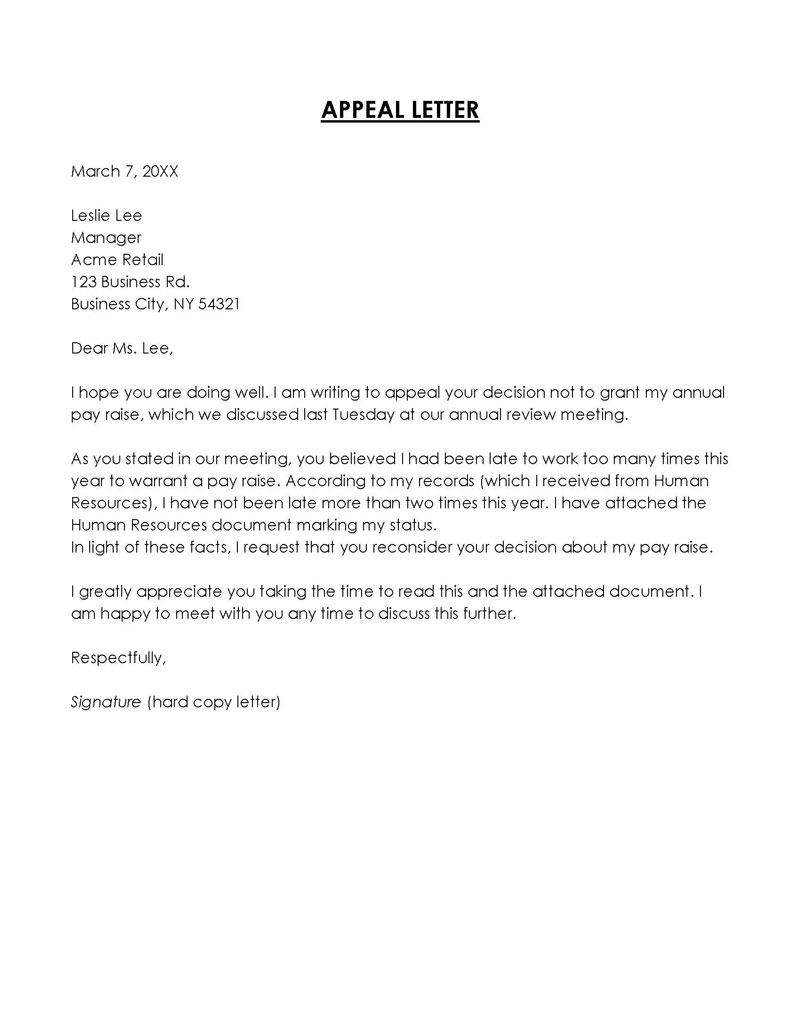
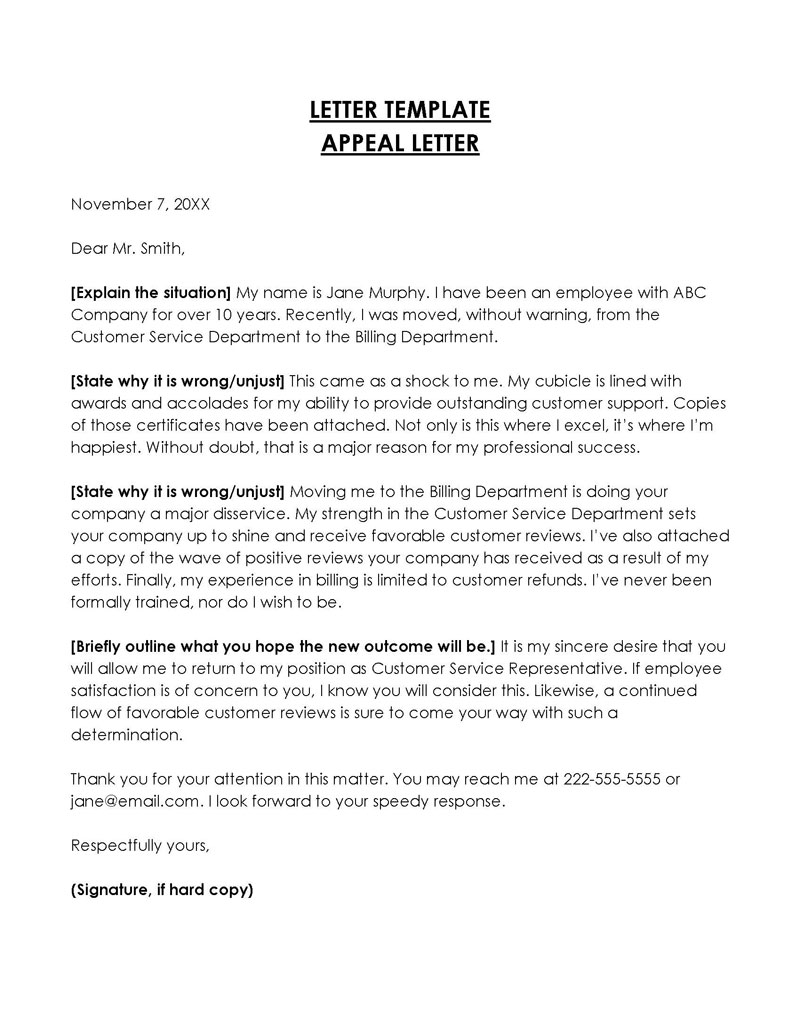
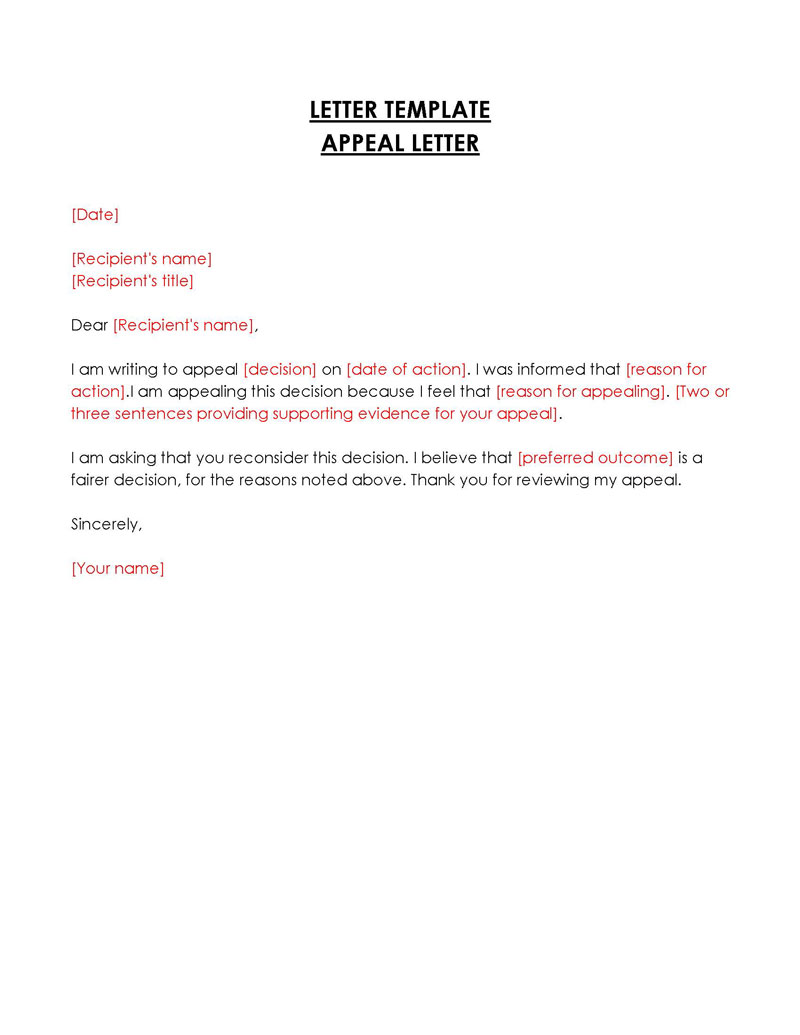
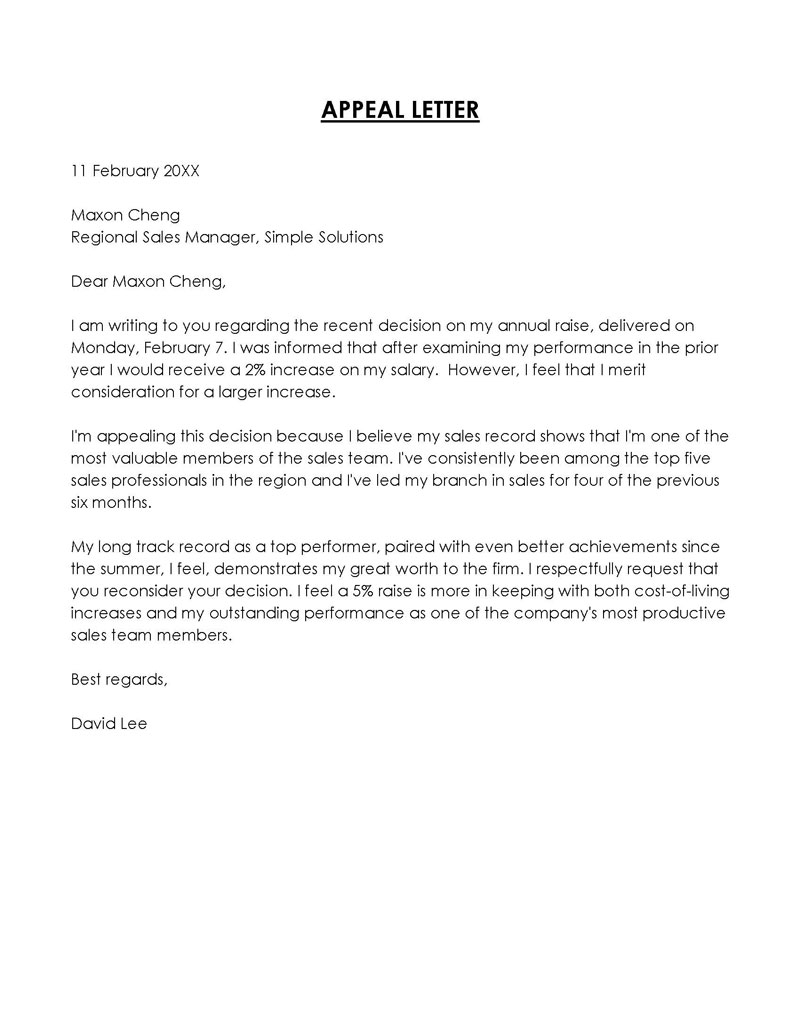
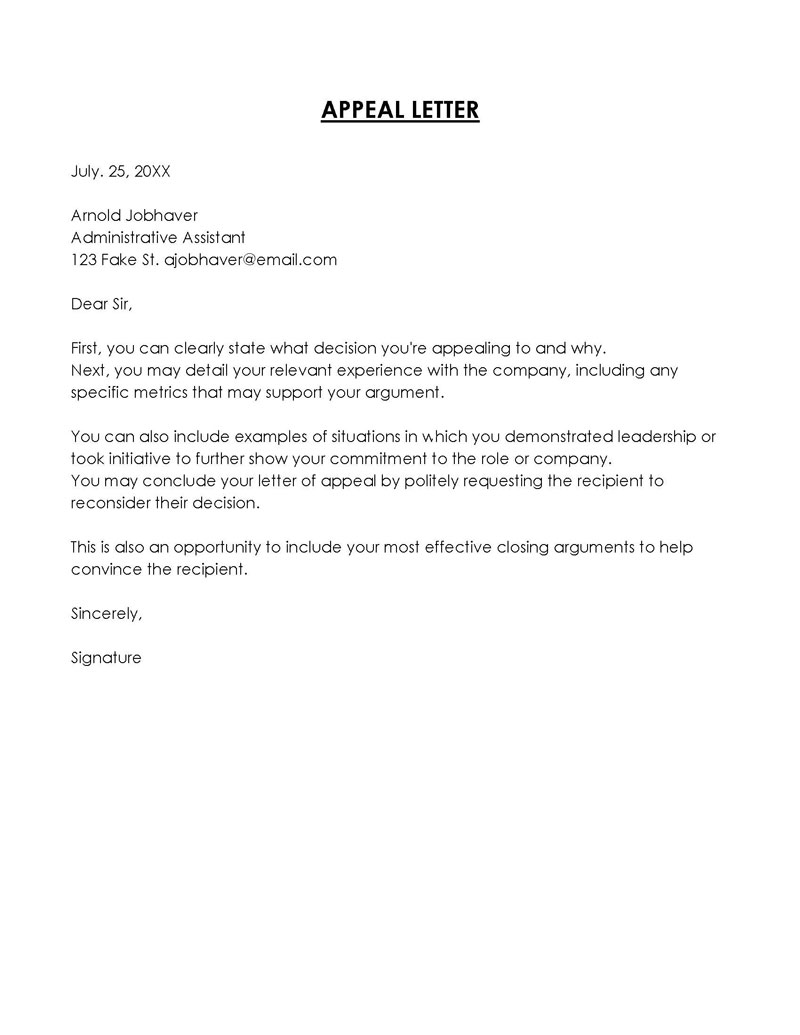
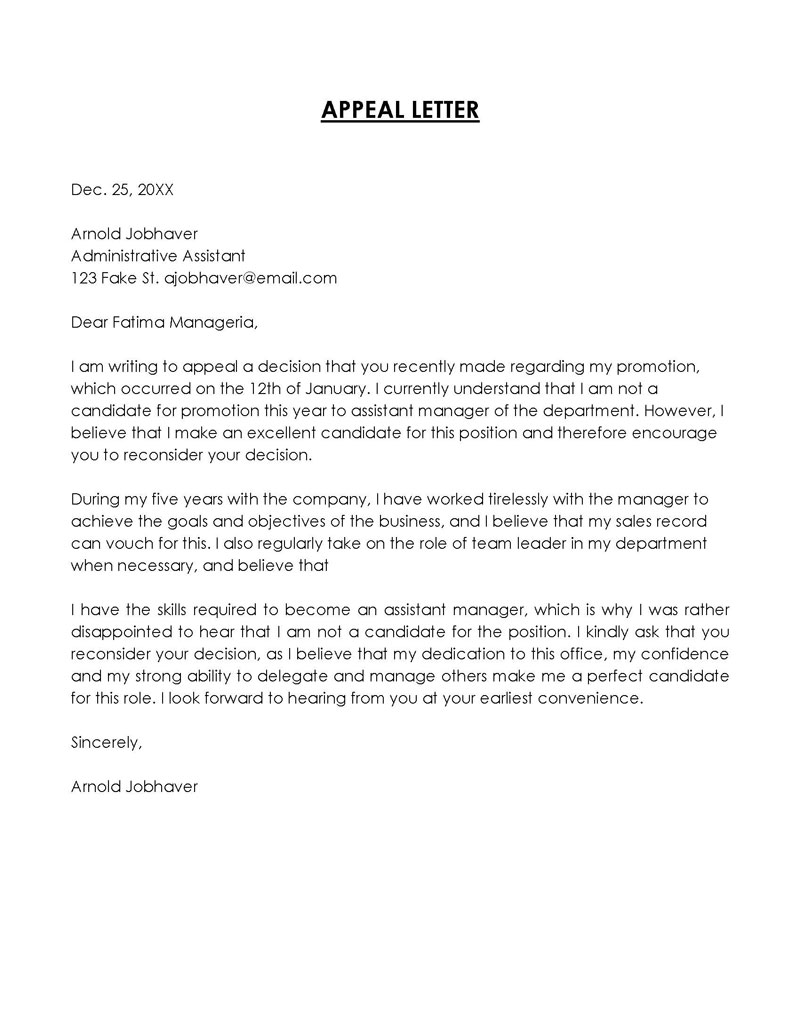
Format of an Appeal Letter
The structure of an appeal letter is the same as that of a formal business letter. This section discusses the formatting guidelines for it:
Sender’s contact information
The first item that should appear in your letter is the sender’s contact information. This will include the name, address, email address, and phone number of the person writing the letter.
Date
After providing your identifying details and contact information, including the date, you are writing the letter.
Recipient’s contact information
The recipient’s contact information is next. This should include the name, title, address, and email address of the person who will be responding to your letter.
Subject line
The letter’s subject line should be brief, highlighting the letter’s purpose or reason for appealing.
Salutation
The letter’s salutation should be personalized for the recipient using their correct name and title to establish rapport. However, there are cases where the letter’s recipient may be unknown. In such situations, using a general salutation such as “dear sir/madam” or “to whom it may concern is acceptable.”
Introduction
This section introduces the main idea and establishes the tone for the rest of the letter. Your introduction should explain why you are writing the letter and what you are trying to achieve.
Body
The body will contain all the details of your appeal. These details should be written in a logical, organized manner.
The last thing to do before signing off is to express gratitude to the concerned committee for taking the time to review your appeal and consider your request. Afterward, include a complimentary close or sign-off such as “yours respectfully,” “sincerely,” etc.
Signature line
Finally, end the letter by providing your signature underneath your written name.
Pre-Writing Considerations
It would be best to keep in mind the following pre-considerations before you begin writing your appeal letter:
Check the company policy
Before writing an appeal letter, first, check on the company website or employee handbook to see whether or not the concerned institution has any policy for writing such letters. Most companies and organizations have issued a formal policy stating their stance on accepting such appeals and how they will be handled. Consulting the company’s HR representative is also advisable, as they will guide you on how to go about your appeal process.
Verify the appeal process
In addition to checking the company’s policy on writing and presenting appeals, you must also know the exact process and procedure for appealing. It would help if you asked the concerned authority to give you information regarding the time limits for making appeals, formal provisions or guidelines on how to appeal, and the specific details to include to ensure that you present your case effectively.
Know where to send the letter
It is also vital that you have a clear idea of where the appeal letter will be sent and how it will reach the recipient. This will ensure that the letter reaches its intended recipient, but it will also ensure that the resolution you are hoping to get is not delayed.
Writing an Appeal Letter in 8 Steps
An appeal letter should include all the details and information that will help you convince the person making a final decision regarding your appeal to consider your request and change their decision accordingly.
To ensure that you write a fantastic letter, consider including the following essential details:
1. Introduce yourself
Begin the letter by introducing yourself to the recipient. This is mainly the case where you have not provided your personal information in the header or where you are sending the correspondence via email. This should include your full name, title, position, institution/organization’s name, and the relevant department. Providing this information allows the recipient to identify the sender quickly.
2. State the purpose of the letter
Write a statement that clearly explains why you are writing the letter. This will help the reader better understand your objective in writing the letter and how it relates to them.
3. Explain the situation or event
Next, explain the situation or event that compelled you to write the letter. Be as clear and specific as possible while doing so. However, do not write this part of the letter in a manner that is too emotional or disrespectful to the committee’s decision-making ability.
4. Explain why it is wrong or unjust
Include a paragraph that clearly explains why you feel the committee’s decision was wrong or unjust. This should be written from an objective point of view and should include details of your argument in a manner that is easy to read and understand. Remember that you are trying to convince the recipient to change their mind about your case, so make sure you have all your facts right and present your arguments persuasively and convincingly.
5. Admit mistakes (if any)
It is crucial to note that appealing against a given decision does not mean that you are entirely innocent of the situation. You may have knowingly or unknowingly committed a mistake that resulted in the committee making a decision that does not favor you. If this is the case, taking responsibility for your errors and admitting them will further strengthen your appeal letter.
This will enable the committee to understand that you have learned from your mistakes, and you are not asking them to grant you immunity from the consequences of your actions but rather a reconsideration of their otherwise harsh or unfair decision against you.
6. State the facts
You need to present all the facts that support your appeal concisely and objectively. It would be best if you do not try to exaggerate or mislead the committee by presenting information that is not realistic or backed by concrete evidence.
7. Describe what you would like to happen
After stating your facts, ask for a specific action you would like the recipient to take in response to your appeal. This helps to keep the focus of the letter sharp and direct. Including the resolution you hope to get from making your request also eases the committee’s decision-making process as it helps them determine the best course of action to take.
8. A courteous thank you
At the end of the letter, write a brief and polite closing statement that reiterates your request for reconsideration and includes a courteous thank you to the recipient for taking the time to consider your appeal request. You should also include your contact information so that the committee can follow up with you.
Lastly, include an appropriate sign-off such as yours sincerely, yours respectfully, etc., and then provide your name and signature.
Appeal Letter Template
[Your Name]
[Your Address]
[City, State, Zip Code]
[Your Email Address]
[Your Phone Number]
[Date]
[Recipient’s Name or Department]
[Company Name]
[Company Address]
[City, State, Zip Code]
Subject: Appeal Regarding [Specific Decision, e.g., Termination, Demotion, Denial of Promotion]
Dear [Recipient’s Name or Department],
I am writing to formally appeal the recent decision regarding my [specify the decision, such as termination, demotion, denial of promotion, etc.] made by [department or individual’s name, if known] on [date of the decision]. I believe that this decision was not reflective of my professional conduct, contributions, or the circumstances surrounding the situation. Therefore, I respectfully request a thorough review and reconsideration of this decision.
Firstly, I would like to express my dedication and commitment to my role as [Your Position] at [Company Name]. Over the [duration of your employment], I have consistently demonstrated [specific skills, achievements, or contributions relevant to your case]. [Provide a brief summary of your argument, including any misunderstandings, extenuating circumstances, or reasons why the decision should be reconsidered.]
For instance, [describe a specific situation or evidence that supports your appeal. This could include achievements, mitigating circumstances, or any relevant information that was not considered in the initial decision].
I believe that the decision to [repeat the specific action being appealed] may have been based on [state the reason you believe led to the decision, such as a misunderstanding, a lack of information, etc.], and I am concerned that it does not fully reflect [mention any company policies, your performance reviews, or other factors that support your case].
In light of the above, I kindly request the opportunity to meet and discuss this matter further. I am willing to provide any additional information or documentation that may be required to support my appeal. I am confident that upon review, [Company Name] will find sufficient reason to reconsider the decision.
I am committed to my professional growth and to contributing positively to [Company Name]. I am hopeful for a favorable outcome and am eager to continue my career with the company, contributing to our shared goals and successes.
Thank you for taking the time to consider my appeal. I look forward to the opportunity to discuss this matter in more detail and am available at your convenience.
Sincerely,
[Your Name]
Appeal Letter Sample 01
Subject: Appeal Against Annual Review Decision
Dear Human Resources Department,
I am writing to formally appeal the outcome of my recent annual performance review conducted on January 31, 20XX, by my supervisor, Mr. Derek Hayes. After thorough consideration and reflection on the feedback provided, I believe that the evaluation does not accurately reflect my contributions, performance, and the circumstances that impacted my work over the past year. Therefore, I respectfully request a review and reconsideration of my annual evaluation.
Throughout the past year, I have consistently strived to meet and exceed the expectations for my role as a Senior Software Developer. Despite facing significant challenges, including the transition to remote work and the accelerated project timelines for the Alpha Project, my commitment to delivering high-quality work has never wavered. For example, I successfully led my team in developing the new features for the Alpha Project, which was completed ahead of schedule and praised by our clients for its innovation and reliability.
The review focused heavily on a single project – the Beta Software Update – where deadlines were missed due to unforeseen technical challenges and external vendor delays. While I acknowledge the project’s delays, the evaluation did not fully account for the proactive steps taken to address these challenges, including coordinating with vendors to expedite processes and implementing workarounds that ultimately minimized the delay’s impact.
Furthermore, I believe that my efforts in mentoring junior team members, contributing to our department’s knowledge-sharing initiative, and consistently receiving positive feedback from clients were not adequately considered in my review. These contributions demonstrate my dedication to the team’s success and the company’s values, going beyond the basic requirements of my job description.
I kindly request the opportunity to meet with a representative from the Human Resources Department to discuss my appeal in detail. I am prepared to provide further documentation and examples of my work, feedback from clients and colleagues, and any other information that may support my case. My aim is to ensure a fair and comprehensive evaluation of my performance, considering all contributions and challenges faced during the review period.
I am deeply committed to my professional development and to contributing positively to Tech Innovations Inc. I believe that a reconsideration of my annual review will not only reflect a more accurate assessment of my performance over the past year but also align with our shared goal of fostering an equitable and transparent evaluation process.
Thank you for your attention to this matter and for your consideration of my appeal. I am looking forward to the opportunity to discuss this further and am available at your earliest convenience.
Sincerely,
Jonathan Smith
Appeal Letter Sample 02
Subject: Appeal Against Demotion Decision
Dear Ms. Richardson,
I am writing to formally appeal the decision to demote me from my position as Lead Project Manager to Senior Project Coordinator, as communicated to me on February 10, 20XX, by my department head, Mr. Thomas Klein. This decision was unexpected and, I believe, does not fully consider my contributions, the complexities of the projects I managed, and the significant improvements implemented under my leadership. I respectfully request that this decision be reviewed and reconsidered.
During my tenure as Lead Project Manager, I have consistently met and, in several instances, exceeded the goals set forth by our department. Notably, under my leadership, the team successfully delivered the Phoenix Project three weeks ahead of schedule—a project critical to our company’s portfolio and lauded by our clients for its innovation and quality. This achievement was a testament to our team’s hard work, my strategic planning, and our collective ability to overcome unforeseen challenges.
The decision for demotion, as I understand, was largely influenced by the delays encountered in the Orion Project. While I acknowledge the project did not meet its original timeline, it is crucial to highlight that these delays were due to external factors beyond our control, including supplier disruptions and unforeseen regulatory changes. Despite these challenges, my team and I were able to minimize the impact, ensuring the project’s success without compromising on quality or client satisfaction.
Moreover, I believe that my efforts in fostering a collaborative team environment, mentoring junior staff, and actively contributing to our department’s strategy have not been fully recognized in this decision. My commitment to professional growth and to the success of Bright Future Technologies has always been at the forefront of my actions.
I kindly request a meeting to discuss this matter further, where I can provide additional context and insights into my performance and contributions. I am prepared to present detailed evidence of my achievements, including feedback from clients and colleagues, that support my case for reconsideration of the demotion decision.
My dedication to my role and to Bright Future Technologies remains unwavering, and I am confident that a review of my complete performance record will reveal my positive impact on the company. I believe in the principles of fairness and transparency, and I trust that this appeal will be given the thoughtful consideration it deserves.
Thank you for your attention to this appeal. I am looking forward to the opportunity to discuss this in detail and am available at your earliest convenience.
Sincerely,
Jane Murphy
Key Takeaways
Both letters are formal appeals against adverse workplace decisions—specifically, a negative annual review and a demotion—addressed to Human Resources. Each writer presents a structured argument challenging the fairness of the decision, backed by examples of their achievements and contributions that were overlooked or undervalued.
- Both letters maintain a formal and respectful tone, addressing the recipients appropriately and clearly stating the purpose of the communication right at the beginning. This establishes a professional framework for the appeal.
- Each letter outlines specific achievements and contributions that the writers believe were overlooked or undervalued in their evaluations. By citing particular projects and their outcomes (e.g., the Alpha Project’s success, the Phoenix Project delivery ahead of schedule), they provide concrete evidence to support their appeals.
- Both writers acknowledge the problems that led to the negative decisions (delays in the Beta Software Update and Orion Project) but argue these were due to external factors or inadequately considered efforts to mitigate issues.
- The key request in both letters is for a formal review or reconsideration of the initial decision, suggesting a belief in a possible oversight or misjudgment that could be rectified upon closer examination.
- Each letter expresses the writer’s willingness to discuss the matter further, provide additional documentation, and give examples to substantiate their claims, demonstrating their commitment to resolving the issue.
- Both appeals underscore the writers’ dedication to their roles and their desire for professional growth within the company, reinforcing their value to the organization and their intent to contribute positively.
- The letters conclude politely, thanking the recipients for considering their appeals and expressing eagerness to discuss the matter further, indicating readiness for dialogue and resolution.
These letters are effective in their respectful tone, structured argumentation, and clear communication of a desire for a fair and transparent review process, illustrating a professional approach to challenging adverse decisions.
Do’s and Don’ts of Appeal Letters
While writing an appeal letter, there are certain things that you should keep in mind and things you should avoid to ensure that the final document effectively meets its primary purpose.
Do’s
This section provides a list of things that you should keep in mind while writing an appeal letter:
- Grab the reader’s attention: It is advisable to begin your letter with a brief and engaging introductory paragraph that grabs the reader’s attention. This will help ensure that the reader is invested in your situation, and they will read through the rest of your letter.
- Use business letter format: It is official correspondence. Therefore, it should be written following the standard business letter format. This will help the recipient follow what you are trying to say and make your appeal easier for the reader to read and comprehend.
- Be polite: This is a fundamental rule that needs to be followed by all applicants. Be polite, respectful, and courteous while writing, and do not come across as arrogant or rude.
- Be factual: Your appeal letter must be factual and objective in content. Remember that this is not the place to express your emotions or feelings. Instead, it is your opportunity to present facts and logical arguments that support your case.
- Collect hard evidence: When drafting your appeal letter, you need to collect as much hard evidence as possible. This will help prove the points you are making in the appeal letter. Including hard evidence also helps support your arguments, enabling the committee to reach a favorable decision more quickly.
- Keep it brief: Keep your appeal letter concise without excessive verbiage. Only present the essential points of the case appealingly.
- Edit: Proofread your letter before you send it to ensure there are no spelling or grammatical mistakes and that the content is written accurately.
- Have a third party read the letter: It is good to have a third party, who is not personally involved in the appeal process, read your letter before sending it. The objective person can help you assess if you have any missing points and help you determine if the entire content of the letter is explicit and easy to understand.
- Follow up: Make sure that you follow up with a phone call, email, another letter, or by visiting the concerned authority in person. This will help emphasize the importance of your appeal request and make it clear that you want them to reconsider their decision.
Don’ts
Some of the things to avoid while writing an appeal letter include:
- Don’t be emotional: While writing the letter, you should avoid coming across as being emotional. Instead, try to be objective and present your facts and arguments in a firm but polite and respectful tone.
- Avoid exaggeration: Do not exaggerate your case unnecessarily, and do not write anything that is not supported by evidence and facts.
- Do not be judgmental: Avoid belittling the committee by making negative remarks about their decision. Instead, maintain professionalism throughout the letter and demonstrate your respect for the committee’s decisions.
- Do not be aggressive: Do not be aggressive in tone when writing the appeal letter. Your tone should be humble and polite while making your case.
Frequently Asked Questions
An appeal letter is formal business correspondence. Therefore, it should be restricted to a single page. However, if your appeal case involves a lot of documentation and facts, a two-page is also acceptable.
The biggest mistake is being unprofessional and overly emotional. A clear writing style with a concise outline of the situation or facts, supporting evidence, and objectivity go a long way in persuading the concerned authority to reconsider their decision and give you the resolution you are hoping to get.












